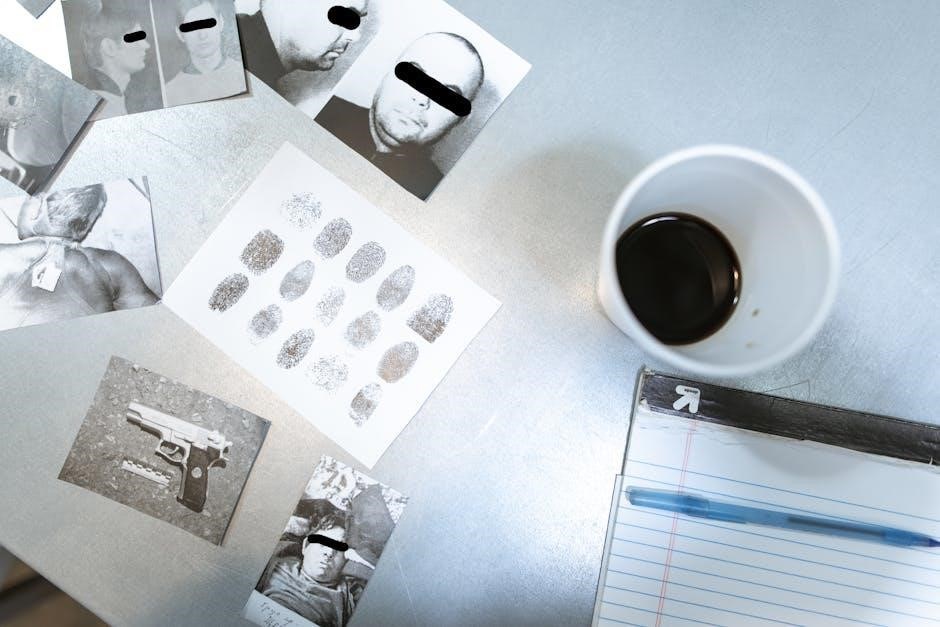
secure dc crime bill pdf
The Secure DC Crime Bill aims to address rising crime rates in Washington, D.C., through reforms to criminal liability, sentencing, and law enforcement strategies.
Overview of the Bill’s Purpose and Key Objectives
The Secure DC Crime Bill aims to reduce crime and enhance public safety in Washington, D.C., by reforming criminal justice policies. Key objectives include stricter sentencing for violent offenses, expanding DNA collection, and addressing organized retail theft. The bill also reinstates anti-loitering laws and creates drug-free zones to combat illegal activities. These measures aim to balance accountability with community safety, addressing rising crime trends while sparking debates on equity and justice.
Historical Context and the Need for Reform
Washington, D.C., faced a significant increase in crime, particularly gun violence and retail theft, prompting calls for legislative action. Previous reforms aimed at reducing incarceration rates inadvertently led to rising crime trends. The Secure DC Crime Bill addresses these challenges by reversing some progressive measures and implementing stricter policies to restore public safety and accountability in the nation’s capital.

Key Provisions of the Secure DC Crime Bill
The bill introduces stricter criminal liability, reduces the youth offender age, expands DNA collection, and adds new penalties for organized retail theft.
Changes to Criminal Liability and Sentencing
The bill eliminates DC’s authority to alter criminal sentences, reduces the youth offender age from 24 to 18, and modifies the DC Sentencing Commission’s composition, giving the mayor more appointees. It also expands penalties for certain offenses and reinstates mandatory minimum sentences for violent crimes, sparking debates over racial equity and mass incarceration. These changes aim to enhance accountability but have drawn criticism from civil rights groups concerned about their impact on marginalized communities.
Reduction of Maximum Age for Youth Offenders
The Secure DC Crime Bill reduces the maximum age for youth offenders from 24 to 18, aligning with traditional definitions of adulthood. This change means individuals aged 18 and above will be treated as adults in the criminal justice system. Critics argue this could lead to harsher penalties for younger offenders and raise concerns about long-term consequences and systemic impacts on marginalized communities.
Expansion of DNA Collection and Pre-Trial Detention
The Secure DC Crime Bill expands DNA collection for certain offenses, allowing law enforcement to gather DNA samples earlier in the process, even before conviction. It also permits pre-trial detention for individuals accused of violent crimes, aiming to prevent further offenses. Civil rights groups have raised concerns, arguing this could lead to mass incarceration and disproportionately affect marginalized communities, exacerbating racial equity issues within the justice system.
New Crimes and Penalties, Including Organized Retail Theft
The bill introduces a new crime for organized retail theft, targeting coordinated theft operations. It imposes stricter penalties for such offenses, aiming to curb rising retail crime. Additionally, the bill revives anti-loitering laws, making it unlawful to loiter with intent to commit a crime. Civil rights groups have criticized these provisions, arguing they could disproportionately affect marginalized communities and lead to broader criminalization of certain behaviors.
Background and History of the Bill
The Secure DC Crime Bill was introduced in early 2024 to address rising crime rates. It underwent significant legislative debate and revisions before passage.
Legislative Process and Development
The Secure DC Crime Bill was developed through a comprehensive legislative process, combining provisions from multiple earlier crime bills. Introduced by the Public Safety Committee, it underwent revisions based on public feedback and stakeholder input. The bill aimed to balance accountability with justice, addressing concerns over rising crime rates and ensuring alignment with community safety needs.
Public and Stakeholder Input
The Secure DC Crime Bill incorporated feedback from various stakeholders, including community leaders, law enforcement, and civil rights groups. Public forums and hearings allowed residents to voice concerns about crime trends and proposed reforms. Despite debates over its provisions, the bill aimed to balance public safety needs with justice reform principles, reflecting input from diverse perspectives to address Washington, D.C.’s unique challenges.

Debate and Opposition to the Bill
The Secure DC Crime Bill faced significant opposition, with critics arguing it could lead to mass incarceration and disproportionately affect marginalized communities, sparking heated debates.
Criticisms from Civil Rights Groups
Civil rights groups strongly opposed the Secure DC Crime Bill, arguing it could exacerbate racial disparities and mass incarceration. They criticized provisions like drug-free zones and anti-loitering laws, claiming these measures disproportionately target marginalized communities. Groups expressed concerns over expanded DNA collection and pre-trial detention, fearing they would deepen systemic inequities. The DC Council’s Office on Racial Equity also warned the bill could worsen racial justice issues, sparking widespread criticism from advocacy organizations focused on criminal justice reform.
Concerns Over Mass Incarceration and Racial Equity
Critics argue the Secure DC Crime Bill could worsen mass incarceration, particularly for communities of color. Stricter sentencing and expanded penalties may disproportionately affect marginalized groups. Civil rights advocates and the DC Council’s Office on Racial Equity warn the bill could exacerbate racial inequities in the justice system. While the bill aims to enhance accountability, opponents fear it may perpetuate systemic biases, leading to over-policing and higher incarceration rates for already vulnerable populations.

Legislative Journey and Approval
The Secure DC Crime Bill passed the D.C. Council with a 12-1 vote, reflecting bipartisan support. Mayor Muriel Bowser signed it into law in March 2024.
D.C; Council Vote and Passage
The D.C. Council approved the Secure DC Crime Bill in a 12-1 vote, marking a significant step toward addressing rising crime rates and enhancing public safety measures in the district.
Mayor Muriel Bowser’s Role and Signature
Mayor Muriel Bowser played a pivotal role in the Secure DC Crime Bill by signing it into law, demonstrating her commitment to addressing rising crime rates and enhancing public safety in Washington, D.C. Her support for the bill underscored its importance in reforming the criminal justice system and implementing stricter measures to combat violent crimes and organized retail theft.
Impact on Crime Rates and Public Safety
The Secure DC Crime Bill aims to reduce rising crime rates and enhance public safety by addressing violent crimes, organized retail theft, and improving law enforcement strategies.
Addressing Rising Crime Trends in Washington, D.C.
The Secure DC Crime Bill targets the surge in violent crimes and property offenses in Washington, D.C., particularly gun violence and retail theft, aiming to restore public safety and order through stricter penalties and enhanced law enforcement tools, while addressing concerns about racial equity and mass incarceration raised by civil rights groups.
Expected Outcomes and Effectiveness
The Secure DC Crime Bill is anticipated to reduce crime rates by increasing accountability and expanding law enforcement capabilities. Proponents believe it will deter violent offenders and improve public safety. Critics argue its effectiveness may be limited, citing concerns over racial disparities and potential over-policing. The bill’s success will depend on implementation and community engagement, with outcomes likely monitored closely by stakeholders and policymakers.

Controversial Aspects of the Bill
The bill’s reinstatement of anti-loitering laws and enhanced penalties for certain crimes has sparked debate, with critics raising concerns about civil liberties and racial equity impacts.
Drug-Free Zones and Their Implications
The Secure DC Crime Bill reintroduces drug-free zones, aiming to combat drug-related crimes. Critics argue these zones disproportionately target marginalized communities, potentially leading to over-policing and increased arrests. Proponents claim they enhance public safety, while opponents highlight concerns about racial equity and mass incarceration. The zones’ implementation raises questions about balancing crime reduction with protecting civil liberties, sparking debates over their effectiveness and fairness in addressing underlying social issues.
Reinstatement of Anti-Loitering Laws
The Secure DC Crime Bill revives anti-loitering laws, enabling police to arrest individuals suspected of loitering with intent to commit a crime. Critics argue this measure unfairly targets vulnerable populations, such as homeless individuals and minorities, leading to racial disparities in enforcement. Supporters contend it deters crime and enhances public safety. The law’s reinstatement reflects broader debates over balancing crime prevention with civil liberties, raising concerns about over-policing and its impact on marginalized communities.

Enforcement and Implementation Strategies
The bill enhances police authority, expands DNA collection, and tightens sentencing guidelines to reduce crime and improve public safety in Washington, D.C.
Role of Law Enforcement and the Judiciary

The bill strengthens law enforcement authority through expanded DNA collection and stricter sentencing guidelines. Judges gain discretion in pre-trial detention for violent crimes, while prosecutors handle organized retail theft cases. The judiciary must balance public safety with fair sentencing, ensuring accountability while addressing rising crime trends. Law enforcement agencies are tasked with effective implementation and community engagement to support these reforms.
Community Engagement and Prevention Programs
The bill emphasizes community involvement through prevention initiatives, aiming to reduce recidivism and address root causes of crime. It funds programs targeting at-risk youth and neighborhoods with high crime rates. Collaboration between law enforcement, schools, and local organizations is encouraged to create safer environments and promote trust. These efforts aim to foster long-term crime reduction by addressing social and economic factors contributing to criminal behavior.

Criticism from Federal and Local Officials
President Joe Biden signed a measure repealing parts of the DC criminal code, while D.C. Council Chairman Phil Mendelson expressed concerns about federal intervention and local autonomy.

President Joe Biden’s Stance and Congressional Intervention
President Biden opposed progressive criminal justice reforms in D.C., signing a resolution to overturn parts of the crime bill. This move, supported by 18 Democrats, reflected bipartisan concerns over rising crime rates and public safety in the nation’s capital. Congressional intervention underscored federal oversight of D.C.’s local governance, sparking debates on statehood and home rule. The president’s stance aligned with calls for stricter law enforcement measures.
D.C. Council Chairman Phil Mendelson’s Response
D.C. Council Chairman Phil Mendelson reluctantly acknowledged the bill’s passage, expressing skepticism about its ability to reduce crime. He emphasized the need for balanced reforms and criticized federal interference in local governance. Mendelson highlighted concerns over racial equity and mass incarceration, urging a focus on community-based solutions rather than punitive measures. His response reflected the tension between addressing crime and preserving progressive justice reforms in the District.

Future Implications and Potential Reforms
The Secure DC Crime Bill may lead to long-term shifts in criminal justice policies, with potential reforms focusing on balancing public safety and equitable justice systems.
Public Reaction and Advocacy for Change
The Secure DC Crime Bill has sparked significant public debate, with advocates pushing for reforms that balance safety and equity. Civil rights groups have criticized provisions like drug-free zones and anti-loitering laws, arguing they could disproportionately affect marginalized communities. Meanwhile, supporters emphasize the need to address rising crime rates and protect residents. The bill’s passage has ignited calls for further dialogue and potential amendments to ensure fair implementation and community trust.
Long-Term Effects on DC’s Criminal Justice System
The Secure DC Crime Bill may lead to increased incarceration rates, particularly for youth and marginalized communities, due to stricter sentencing and expanded DNA collection. Civil rights groups warn of potential racial disparities, while supporters argue the reforms will deter crime and enhance public safety. The bill’s impact on the criminal justice system will likely spark ongoing debates about fairness, equity, and effectiveness in reducing crime in Washington, D.C.
Related posts:
Archives
Calendar
| M | T | W | T | F | S | S |
|---|---|---|---|---|---|---|
| 1 | 2 | 3 | ||||
| 4 | 5 | 6 | 7 | 8 | 9 | 10 |
| 11 | 12 | 13 | 14 | 15 | 16 | 17 |
| 18 | 19 | 20 | 21 | 22 | 23 | 24 |
| 25 | 26 | 27 | 28 | 29 | 30 | 31 |
Leave a Reply
You must be logged in to post a comment.